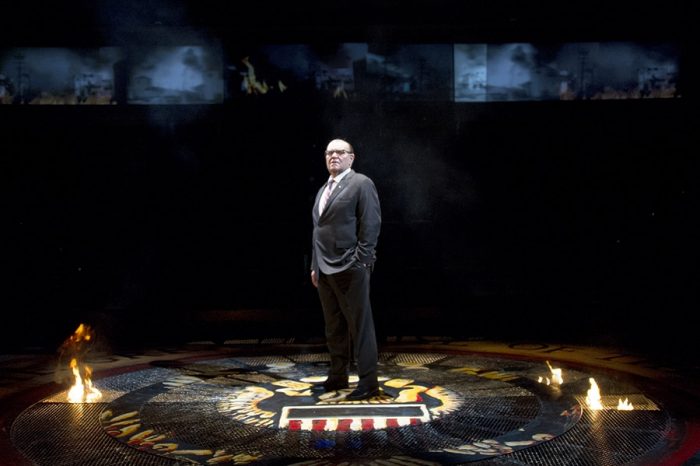Arena Stage brings Lyndon B. Johnson’s idea of a “Great Society” back into the conversation.

Jack Willis as President Lyndon Baines Johnson in The Great Society running February 2-March 11, 2018 at Arena Stage at the Mead Center for American Theater. Photo by C. Stanley Photography
Lyndon Johnson’s domestic policy in 1964, or his idea for a “Great Society,” focused on civil rights, education, healthcare and eliminating poverty. Sound familiar? Many of the issues faced during LBJ’s presidency are strikingly similar to what the U.S. is addressing today.
Pulitzer Prize-winning and Tony Award-winning playwright Robert Schenkkan tells the second part of LBJ’s story in the Washington premier of his play, “The Great Society.” It focuses on the former President’s time in office after his landslide 1964 election, when he was dealing with civil rights protests, ambitious domestic policies, and controversial foreign strategy.
Washington Life: What initially peaked your interest in writing about LBJ?
RS: I grew up in Austin, Texas, which was LBJ-country. My father was hired by the University of Texas-Austin to set up a public television and radio station, and job number one was to get the permission of the then-Senator from Texas, Lyndon Johnson.
He did give his blessing, so in my family growing up, at least initially, he was a friend of the court, a good man.
It was pretty hard to avoid LBJ in Austin in the 50s and 60s.
My feelings about LBJ have evolved over time, and I have a fairly complicated view on him. I think he’s a fascinating character as an individual, speaking as a dramatist. He’s truly a Shakespearean figure. Not just big in his habits and his size, but his vices and his virtues, in his hunger and his achievements and his failures.
He feels like he belongs on stage.
WL: Why is LBJ’s story so timely with regard to today’s political climate?
RS: Well, if you look at it, what are we fighting about today? An ongoing foreign war that seems to have no end and sort of a fuzzy reason to be there, healthcare issues, and civil rights and voting rights. The language has shifted, sometimes grossly, sometimes subtly, but a number of significant issues that we continue to fight about today had their origins there.
And there’s another reason to examine this. Why was Lyndon Johnson able to be so productive legislatively as a President compared to almost any other President who followed him?
WL: “The Great Society” is the sequel to another play you wrote focused on LBJ. Were you always planning to do his story as two separate plays?
RS: I’d always been interested in his story and in finding some way to tell it. I settled on the first term because it had such an extraordinary natural arc. The assassination of Jack and LBJ looking from the essential obscurity as Vice President to the job he had always coveted and plotted and worked so hard for. And now he had achieved it under circumstances no one, including LBJ, would ever have wished for at a time of real crisis. And his success, nonetheless, in passing the most comprehensive Civil Rights law since the Civil War. And then winning an election in his own right with what was then the largest landslide victory in American history.
But I always would have felt disappointed if I didn’t tell the second half of the story. If “All the Way” is a drama, then “The Great Society” is tragedy. How is it a politician so gifted, so commanding, could have blundered so horribly in Vietnam? He knew his disastrous foreign policy would doom his domestic policy, which is what he truly loved. And indeed, it did.
WL: Why you feel it’s important to keep LBJ’s legacy alive?
RS: Someone who served under LBJ once said that we live in the world LBJ created, and I don’t think that’s hyperbole. The domestic policies that he set in motion, the course that he set this country on, is part and parcel of where we are today.
But I also think there are many lessons to be learned. Why was he so successful as a legislator? Why was he able to do so much, and so effectively? That’s a lesson very much worth absorbing and studying. And why did he fail? This is a lesson we seem to grasp with great difficulty, and demands that we reengage with it.
WL: How do you think a D.C. audience will react to this play’s story?
RS: Washington audiences are superb theater audiences because they’re fortunate to have a long history of a really vibrant theatrical community. They’re used to seeing high quality, challenging theater. And they have the additional benefit of their political expertise and interest.
So, I think they’re going to enjoy the hell out of this. I think it will be eminently appealing and provocative.
WL: Is there anything you feel the audience should know going in to the play?
RS: I think the audience is likely to have lived through these very tumultuous times. And what has always been interesting to me and to audiences experiencing this is what they remember and what they don’t remember. What was so important at the time and then what they didn’t pay attention to, or what we lost track of.
And there is also part of the audience that has no personal connection to these events and to them, this is shocking. “He said what on the Senate floor?” “They did that, really?” It’s an emotional ride for everyone even though these two groups come at it from very different perspectives.
“The Great Society” runs through March 11 at Arena Stage.
